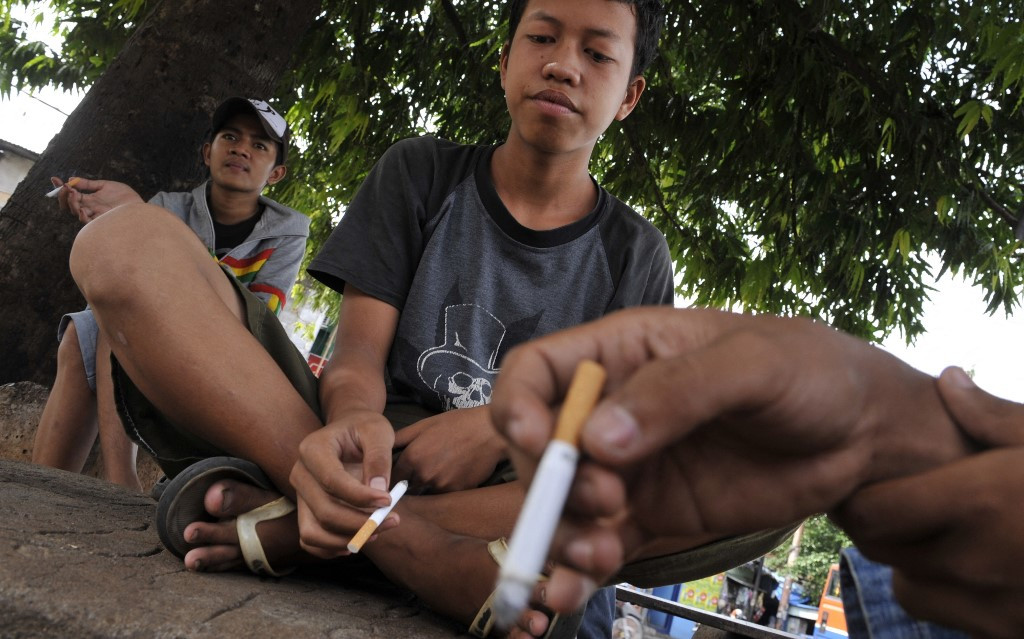Popular Reads
Top Results
Can't find what you're looking for?
View all search resultsPopular Reads
Top Results
Can't find what you're looking for?
View all search resultsLow-income families’ tobacco indulgence hurts essential needs spending, study finds
The study by the Center for Indonesia Strategic Development Initiatives (CISDI) found that on average, smoking households divert around 10.6 percent of their monthly budget on tobacco – their third largest expenditure after housing and foods.
Change text size
Gift Premium Articles
to Anyone
R
ecent research has revealed that tobacco consumption reduces Indonesian households’ spending in essential needs such as food, education and health care, adversely impacting human capital investment in the country, especially in low income families.
The study by the Center for Indonesia Strategic Development Initiatives (CISDI) found that on average, smoking households divert around 10.6 percent of their monthly budget on tobacco – their third largest expenditure after housing and foods.
Tobacco-consuming households allocate around 1.18 percent less budget on food, 3.9 percent less on housing and 2.1 percent less on utilities compared to non-smoking households. They also spend around 1 percent less on education and healthcare.
The study also created a simulation showing that cutting tobacco purchases by half would increase spending on staples by 14 percent, meat by 35 percent, housing by 24 percent and education by 31 percent in tobacco-consuming households.
The research suggested that the so-called crowding out effect of tobacco on food spending contributes to nutritional inadequacy among smoking households, especially in low income families, as they have lower calorie and protein intake compared to their non-smoking counterparts.
CISDI's principal Investigator I Dewa Gede Karma Wisana said that the recent report corroborated the findings of previous studies showing that tobacco-consuming households in the country have inferior child health outcomes compared to non-smoking households.
"A 2018 study finds that children living with smoking parents have a 5.5 percent higher probability of stunting compared to children whose parents are non-smokers. A similar study also found that children growing up in smoking families have lower cognitive scores than those from non-smoking families," Dewa said last week.
He said the impact is even more prevalent in low income households, as they tend to lower the quality and quantity of their foods to compensate for their tobacco spending.
"This indicates that the crowding out effect of tobacco might have long-term consequences as lower children’s human capital investment might detrimentally affect their future outcomes," he concluded.
Persistent problem
Some 34 percent of Indonesia's population, 70.2 million people, are smokers with around 75 percent of them having started smoking before the age of 20.
Despite the continuously increasing cigarette excise tax over the years, tobacco consumption in Indonesia has yet to show any substantial decline.
Data from the World Health Organization (WHO) shows that the smoking rate among people over 15 years old only dropped by 1.6 percent in the last ten years, from 36.1 percent in 2011 to 34.5 percent in 2021. Yet after accounting for the population growth, it is estimated that there were 8.8 million more adult smokers in 2021 than in 2011.
With a relatively high smoking rate, particularly among adult males, around 63 percent of households in Indonesia have at least one smoker. There were 47.7 million smoking households in Indonesia in 2021, consisting of 184.5 million individuals.
However, 78 percent of those who lived in smoking households did not consume tobacco but lived and shared resources with smoking family members.
According to data from the Health Ministry, tobacco kills around 290,000 people in the country each year and in 2017 the economic burden of smoking in the country amounted to 531.8 trillion, roughly 3.6 times greater than the tobacco excise revenue that year.
Slow progress
Indonesia is one of only seven nations around the globe that is yet to ratify the World Health Organization's Framework Convention on Tobacco Control (FCTC).
Yet, despite the growing health concerns, efforts to implement stricter tobacco controls continue to be met with resistance from industry players.
The Health Ministry has been seeking to revise the prevailing Government Regulation (PP) No. 109/2012 on the restriction of addictive tobacco substances for health since 2018, but the progress remains sluggish.
Under a planned new regulation, the Health Ministry is looking to control the promotion and packaging of e-cigarettes, which have remained unregulated since their legalization in 2018.
The ministry is also seeking to increase the size of graphic health warnings on tobacco packaging from 40 to 90 percent, ban the advertising, sponsorship and promotion of tobacco products and prohibit the selling of single cigarettes.
CISDI has urged the government to implement a more effective control policy to significantly reduce tobacco consumption in the country. The NGO also suggested that the tobacco tax revenue should be allocated to support smoking prevention campaigns, education and healthcare in low income families, to offset the negative impact of smoking to human capital investment in the country.










